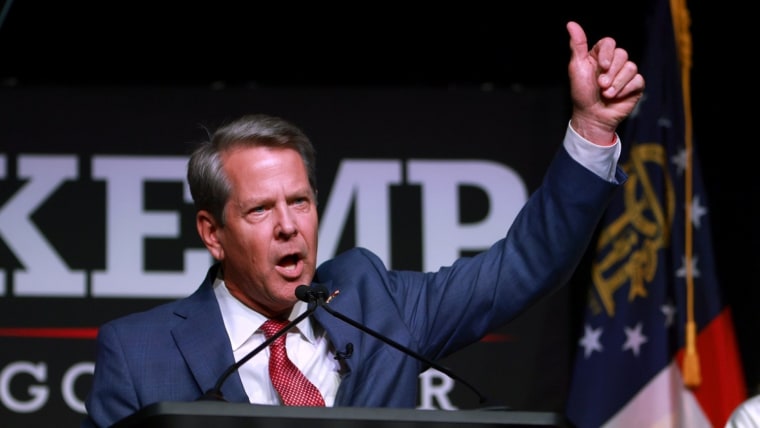ATLANTA — By flexing so often in GOP primaries, Donald Trump has exposed the limits of his political muscle.
The former president’s top targets — Gov. Brian Kemp, Secretary of State Brad Raffensperger and Attorney General Chris Carr — manhandled their challengers in Georgia on Tuesday.
Next door, in Alabama, GOP Senate candidate Mo Brooks survived Trump yanking his endorsement to qualify for a primary run-off.
And those high-profile setbacks came just a week after Trump favorite Rep. Madison Cawthorn lost a re-nomination battle for a western North Carolina House district, while Mehmet Oz, the TV doctor who bore Trump’s blessing, is still awaiting his fate in a photo-finish Pennsylvania Senate primary.
Win or lose, Trump’s endorsement often guarantees less than a third of the primary electorate, a recurring data point that GOP operatives around the country are paying close attention to as Republicans battle over the future of their party and the former president gears up to make a third bid for the White House.
Rank-and-file Republican voters also see some diminishment in Trump’s powers.
“Now that he’s kind of out of it, he’s not in a position that he was in,” Chris Russell, 40, a GOP voter from Marietta, Georgia, said Tuesday afternoon. “I think he’s cooled off a lot.”
Russell, who backed Trump in 2020 and Libertarian nominee Gary Johnson in 2016, cast his ballot for Kemp in a primary against Trump’s recruit, former Sen. David Perdue, R-Ga.
“I don’t like how he tried to bully his way back at the end of the [2020] election,” Russell said of the former president. “The reason I voted for Kemp is, overall, I’m satisfied with how he’s been running the state, and I like the fact that he stood up against Trump.”
Despite Tuesday’s rebuke, Trump will surely finish the primary season with a high “batting average” — the political shorthand for winning percentage in endorsements. Going into Tuesday, he had endorsed in 66 House, Senate and gubernatorial races and had only lost three times, according to the NBC political unit’s tracker. In most cases, he tapped an incumbent, meaning he took strong odds.
Indeed, whether Trump endorsed them or endorsed their opponents, incumbents tended to win their races. And in many cases, including those of a half-dozen House members in Texas who were unopposed in the primary, his picks faced little or no competition.
Trump, posting Wednesday on his Truth Social media site, pointed to his overall record in endorsing candidates — which now features seven defeats, including four statewide races in Georgia on Tuesday.
“A very big and successful evening of political Endorsements. All wins in Texas, Arkansas, and Alabama,” he wrote while also paying tribute to Herschel Walker’s big Senate win in the Georgia Senate primary. Overall, Trump chalked up his record so far as “100 wins, 6 losses (some of which were not possible to win), and 2 runoffs.”
A Trump spokesman did not reply to a message seeking comment for this article, but one confidante summed up Tuesday night as “brutal.”
“We knew Perdue was going to lose, but not like this. And yeah, the [former] president was concerned that Hice wasn’t getting the job done against Raffensperger,” said the Trump confidante, who was not authorized to speak on the record about private conversations with the former president. “But the fact remains: Trump is the leader of this party. Everyone wants his endorsement in the primaries for a reason. It matters. But if you run a bad campaign, it only matters so much.”
One source in Trump’s orbit said he has mostly gotten burned by engaging in elections for state offices, like he did at several rungs of the ballot Tuesday in Georgia.
“I suspect that when primary season is over, there will be a noticeable difference in his record in Senate/House primaries vs governor primaries,” the source said over text. “Generally speaking, national politics and national endorsements matter a whole lot less in state races, where local issues tend to be king, than they do in federal races.”
The trouble for Trump isn’t just that he’s losing races. It’s the anemic share of the vote that his candidates are taking in some of the marquee races. Perdue hardly registered, capturing 21.8 percent of the vote with 95 percent of precincts reporting.
The frequent interventions in GOP primaries are spreading his brand thin, alienating longtime allies and creating a playbook for eroding his influence in the party, according to several GOP insiders who spoke to NBC News on a condition that speaks to his remaining power: anonymity.
The endorsements have left a bitter taste in the mouths of loyalists who didn’t get them, and voters have been left to wonder why he is abandoning longtime allies to back newcomers to the political stage like Oz and Senate candidate J.D. Vance in Ohio, where Trump’s endorsement catapulted him to the front of the pack.
“Trump is moving away from his own movement and he doesn’t even know it,” said one former Trump aide who has done work for multiple primary campaigns this year. “His instincts have gotten worse. He was running toward the movement, now he’s running toward himself.”
Outflanking Trump
Savvy candidates now have space to outflank him, but they have to do so carefully.
No one is a better example than Kemp. Outraged by Kemp’s refusal to overturn the state’s 2020 presidential vote for Joe Biden, Trump recruited Perdue to run against the incumbent, held rallies for him and financially propped up the former senator’s campaign
None of it dented Kemp, who leveraged the benefits of incumbency by out-raising Perdue and using this spring’s lawmaking session to sign a raft of laws that rallied conservatives. At the same time, Trump’s blows against Kemp made the governor more attractive to anti-Trump and Trump-weary Republicans. Finally, Kemp refused to get into the kind of feud with Trump that would energize the MAGA base against him.
“How he has scored conservative policy wins without making himself a never-Trumper, I think that is a model for people to follow,” said one Kemp adviser. “We gave Trump voters in our state permission to support both the governor and Trump. Trump voters will forgive Trump being mad at you. … What they won’t forgive is you attacking Trump.”
Kemp’s strategy, coupled with wins by many Trump favorites in Tuesday’s elections, show that the former president’s political movement remains strong, said Steve Bannon, a former White House and campaign aide to Trump.
“It’s the rise of MAGA and the MAGA agenda,” Bannon said. “The movement that Trump is the leader of, he’s kind of on the moderate side. … The center of gravity has definitely moved to the right.”
The floor is low
Kemp wasn’t the only Georgia incumbent to win in a blowout against a Trump-backed candidate. Carr held John Gordon to little more than 25 percent, and Raffensperger’s rival, Rep. Jody Hice, collected only about a third of the vote.
Trump’s endorsed candidate in the insurance commissioner’s race, Patrick Witt, took only 17 percent of the vote. Witt ran for the office after leaving the crowded primary for Georgia’s 10th Congressional District when Trump endorsed Vernon Jones, who entered that contest after leaving the race for governor to give Perdue a better shot at beating Kemp one-on-one. Jones came in second Tuesday night, with 22 percent of the vote, and is in a runoff against Mike Collins.
The low floor for Trump-backed candidates in high-stakes contests is becoming a familiar sight for political insiders, even when they win.
In Idaho and Nebraska gubernatorial races last week, Trump-backed candidates lost with about 32 percent and 30 percent of the vote, respectively. In North Carolina, where Ted Budd rode a Trump endorsement to victory with almost 57 percent of the vote, Cawthorn lost his 11th District House seat with almost 32 percent. Bo Hines, running in the similarly crowded 13th District, won — with 32 percent.
Earlier this month, Vance won the Ohio GOP Senate nomination with about 32 percent of the vote, while Madison Gesiotto Gilbert beat a crowded field to take the state’s 13th District primary with Trump’s support and just under 29 percent of the vote.
“He does move votes and he can put someone over the top with a plurality, but there’s not a majority of voters in a Republican primary” who will blindly follow Trump, said one operative who has worked for candidates running against Trump-backed hopefuls. Trump has been most successful, the operative said, when his candidate gets financial support from an outside source, such as investor Peter Thiel or the conservative Club for Growth.
As for the GOP primary electorate, said former Rep. Lynn Westmoreland, R-Ga., there’s some sense that Trump has gone a bit off-script.
“I think the MAGA voters are still very strong MAGA voters,” he said. “I think that a lot of people say ‘I love Donald Trump, I love him, I’m a big MAGA fan, but he’s kind of picked the wrong man or woman for this position.’ … I think he’s gone in and not looked at the lay of the land locally, and some of his decisions have been bad.”
But, pointing to the former president’s batting average in endorsements, Westmoreland said he’s still the exclusive favorite for the 2024 GOP nomination: “If Trump runs, it’s his.”
Marc Caputo reported from Atlanta, and Jonathan Allen from Washington, D.C.
Source: | This article originally belongs to Nbcnews.com










